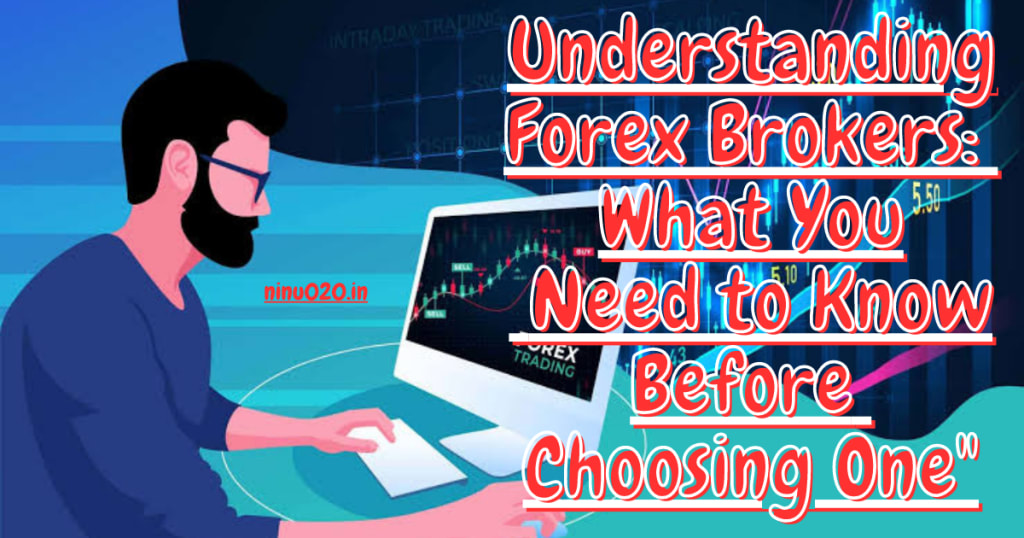Understanding Forex Brokers: What You Need to Know 10 Points Before Choosing One”
Forex Brokers

Understanding Forex Brokers: What You Need to Know Before Choosing One"
Are you new to forex trading and still confused about how to choose the right broker? When there was too many options out there, you can't take the decision on the best one. Let me guide you through the process of selecting the most suitable forex broker for your needs.
A Forex Broker is a financial services firm that provides traders access to the currency market. Forex Brokers use a trading platform to buy and sell Currencies and other financial instruments. They charge traders fees or commissions on each trade by their clients.
Research, education, technical analysis, and customer support are also part of their services to help traders make informed and make easy trading decisions for their clients. We have to become Wise in choosing the trade and the forex broker provides us with these facilities.
Types of Forex Brokers
There are three main types of Forex Brokers:
• Market makers provide liquidity to the market by acting as counterparties to traders.
• ECN brokers or electronic communications network brokers, match buy and sell orders from different traders.
• STP brokers, or straight-through processing brokers, act as intermediaries between traders and liquidity providers, without taking on the risk of market making.
What is Investing
Investing is a smart act of investing money wisely expectation of generating a return or profit by allocating money, time, or resources. The primary goal of investing is to grow wealth over time Investing can take many different forms, from buying stocks and bonds to investing in real estate or starting a business. And growing faster than it would by simply saving it.
There are many different types of investments, each with its own level of risk and potential reward. Some common types of investments include:
Stocks: Stocks represent ownership in a company, and their value can fluctuate based on the company's financial performance and market conditions.
Bonds: Bonds are debt securities issued by companies or governments. They pay a fixed rate of interest and have a set maturity date.
Mutual funds: Mutual funds are investment vehicles that pool money from many investors to purchase a diversified portfolio of stocks, bonds, or other assets.
Real estate: Real estate investing involves buying and holding property with the expectation of generating rental income or selling the property at a profit.
Forex trading, also known as foreign exchange trading or currency trading with the largest and most liquid financial market in the world, with an estimated daily trading volume of over $5 trillion.
What Are Trading Platforms? How to Get Started with Trading?
Trading platforms are software applications that allow traders to access financial markets and execute trades. There are many different trading platforms available, each with its own features and capabilities. Some of the most popular trading platforms include Meta Trader, Trading View, and think or swim.
Technical Analysis
Technical analysis is a method of analyzing financial markets that involves studying price charts and identifying patterns and trends. Technical analysts believe that historical price data can provide insights into future price movements and use a variety of tools and indicators to help them make trading decisions.
Fundamental Analysis
Fundamental analysis is a method of analyzing financial markets that involves studying economic and financial data to determine the intrinsic value of an asset. Fundamental analysts believe that market prices can deviate from their true value and use a variety of metrics, such as earnings and revenue, to identify potential trades.
Risk Management
Risk management is the process of identifying and mitigating potential risks in trading. Trading involves a high level of risk, and traders need to be able to manage their risk effectively in order to be successful. Some common risk management techniques include setting stop-loss orders, diversifying your portfolio, and limiting your leverage.
How to Get Started with Trading?
Getting started with trading is relatively easy. Here are the steps you need to follow:
• Learn the Basics: Before you start trading, it's important to learn the basics of trading. This includes understanding how financial markets work, different types of assets, and how to read charts and graphs.
• Choose a Broker: You'll need to choose a broker to help you buy and sell assets. It's important to choose a broker that's reputable and has a good track record.
• Open an Account: Once you've chosen a broker, you'll need to open an account. This is a simple process that can be done online.
• Fund Your Account: Once your account is open, you'll need to fund it with some capital. You can start with a small amount and gradually increase your investments as you become more experienced.
• Start Trading: With your account funded, you can start trading. It's important to start small and gradually increase your investments as you become more experienced.
Facts to be considering choosing a forex broker
When choosing a forex broker, traders should consider a range of factors such as regulation, trading platform, fees, customer support, and more.
Regulation is one of the most important factors to consider when choosing a forex broker is regulation. We can consider these points the financial conduct authority (FCA), the Australian securities and investments commission (ASIC), or the securities and exchange commission (sec) in the united states. Regulated forex brokers are required to comply with strict regulations that protect traders from fraud and ensure fair trading practices.
Trading platform the trading online platform is the software that traders use to execute trades and access market data. The platform should be user-friendly, and stable, and provide traders with the tools they need to analyze the market and execute trades.
Fees transparent pricing with no hidden fees is one of the most important factors. Forex brokers make money by charging fees or commissions on each trade. Compare the fees of different brokers to find one that offers competitive pricing.
Customer support new traders should choose a broker that provides responsive customer support through email, phone, or live chat. Good customer support is essential when trading with a forex broker. Always choose a broker who has comprehensive support.
Education and research finally, traders should look for forex brokers that provide education and research tools to help them make informed trading decisions. The broker should be aware of offering a range of educational resources such as webinars, video tutorials, and trading guides. Transparent pricing with no hidden fees is one of the most important factors. Forex brokers make money by charging fees or commissions on each trade. Compare the fees of different brokers to find one that offers competitive pricing.
Customer support new traders should choose a broker that provides responsive customer support through email, phone, or live chat. Good customer support is essential when trading with a forex broker. Always choose a broker who has comprehensive support.
Education and research finally, traders should look for a forex broker that provides education and research tools to help them make informed trading decisions. The broker should be aware of offering a range of educational resources such as webinars, video tutorials, and trading guides
Myths and Facts About Forex Brokers
Forex trading is becoming increasingly popular, and with it comes a lot of misinformation and misconceptions about forex brokers. Here We explore some of the most common myths and facts about forex brokers.
Myth: Forex Brokers Are All Scammers
Fact: There are many reputable brokers that are regulated by top-tier authorities and provide a safe and secure trading environment for their clients. While it is true that there are some unscrupulous forex brokers out there, not all brokers are scammers.
Myth: Forex Trading Is a Get-Rich-Quick Scheme
Fact: Forex trading requires a solid understanding of fundamental and technical analysis, risk management, and discipline Many traders lose money in the forex market due to a lack of knowledge and poor trading strategies. Forex trading is not a get-rich-quick scheme. It requires a significant amount of time, effort, and dedication to become a successful trader.
It is important to have a trading plan and stick to it, rather than relying on luck or emotional decision-making. Forex trading requires a solid understanding of fundamental and technical analysis, risk management, and discipline. It is important to have a trading plan and stick to it, rather than relying on luck or emotional decision-making.
Myth: Forex Brokers Manipulate the Market
Fact: Prices are determined by the forces of supply and demand, and no single entity can manipulate them. Forex brokers do not have the ability to manipulate the market.
This is why it is important to choose a broker that is regulated by a reputable authority and has a good reputation in the industry.
Myth: High Leverage Is the Key to Success in Forex Trading
Fact: High leverage can be a double-edged sword in forex trading. While it can amplify profits, it can also amplify losses. Traders should be aware of the risks involved in high-leverage trading and use it with caution.
It is important to have a solid understanding of risk management and have a trading plan in place before using high leverage. Traders should also choose a broker that offers flexible leverage options and provides education and resources on the risks and benefits o
Why Forex Brokers are a Better Investment
Forex trading has gained popularity in recent years as more people seek to invest in the global currency markets. As the world becomes more interconnected, the need for international currency exchange has increased, leading to the growth of the forex market.
Liquidity
High liquidity also means that traders can take advantage of small price movements and potentially make profits. One of the advantages of forex trading is the high level of liquidity. This means that there is always a buyer and a seller for any currency pair, and traders can enter and exit trades quickly and easily. The forex market is the largest financial market in the world, with an average daily trading volume of over $5 trillion.
Diversification
Diversification is especially beneficial during times of market volatility when traditional investments may experience significant losses. Forex trading allows investors to diversify their portfolios and reduce risk, involving buying and selling currencies from different countries, which means that traders can take advantage of fluctuations in currency values to potentially make a profit. This is
Flexibility
Forex trading offers investors flexibility when it comes to trading. The forex market is open 24 hours a day, five days a week, which means that traders can trade at any time that is convenient for them. This allows traders to adjust their trading schedule to fit their lifestyles and work commitments.
Low Entry Barrier
Traders can start with a small initial investment and gradually increase their capital as they gain experience and knowledge. Forex trading has a low entry barrier compared to other investments such as stocks and real estate.
Leverage
Leverage is a tool that allows traders to trade with a larger amount of capital than they have in their accounts. Forex trading allows traders to use leverage to potentially make larger profits. leverage can increase potential profits, and it can also increase potential losses, and traders should use it with caution.
Advantages of Being a Forex Broker
Forex, short for foreign exchange, is the world's largest financial market. With trillions of dollars traded daily, it presents a vast array of opportunities for traders and brokers alike.
High earning potential
As a forex broker, you can earn a significant income from these spreads, especially if you have a large client base. Forex brokers earn their income from the spread between the bid and ask prices of a currency pair.
Flexibility
As a forex broker, you can also set your own schedule and work as much or as little as you want. One of the major advantages of being a forex broker is the flexibility it offers. You can work from anywhere in the world, as long as you have a reliable internet connection.
Access to cutting-edge technology
Forex brokers have access to some of the most advanced trading platforms and tools available in the market. This technology allows you to provide your clients with a seamless trading experience, which can help attract more clients and increase your revenue.
Variety of products
This allows you to offer your clients a diverse range of investment options, which can help increase your client base and income. Forex brokers have access to a vast range of financial products, including currency pairs, commodities, and indices.
High demand
The forex market is highly liquid and trades 24 hours a day, five days a week. This means there is a high demand for forex brokers who can provide their clients with around-the-clock support and assistance.
Intellectual challenge
Becoming a forex broker requires a deep understanding of the financial markets and trading strategies. As a forex broker, you will be constantly learning and improving your skills, which can provide a sense of intellectual challenge and satisfaction.





Comments
There are no comments for this story
Be the first to respond and start the conversation.